WELCOME
First impressions
Welcoming, passionate, well supported and sunny, especially so over the last few weeks. These are the words that come to mind when I think back over my first few weeks here at the University of Suffolk.
I have been delighted by the very warm welcome that the University of Suffolk family has given me on my arrival and the willingness to meet me, talk with me, share thoughts and ideas, and help me settle into this new role. Many of you have commented that we are so friendly because we are small; this certainly makes it easier although I was struck by my attendance at one of our recent staff development days where about 25 staff from across the University were working together and the feedback included enjoying the opportunity to get to know colleagues that were not known previously. As we grow in size as an institution lets keep remembering that its our relationships with people that make an organisation thrive and succeed and that we all need one another and all have an important part to play.
The other overwhelming sense is the passion that we all have for our University. We are the University and I feel very privileged to be working with such a passionate group of people who clearly want us to thrive, grow and develop into a mature higher education institution. Please don’t lose your passion for your work and your institution, its an integral part of our values and our DNA and will carry us far in our endeavours.
I have been very struck by the enormous support and pride that our external partners have in our University. This was palpable during my interview process and has been borne out since in the many meetings I have had with our external stakeholders who are determined to see us succeed.
This is a privilege as well as a responsibility and one we need to take seriously. We will be stronger together and be able to make a greater impact together for our students, our community and our economy and this is an important feature of our place in the town, the county and the region.
I have lost count of the number of times that people mentioned Sussex or Surrey when my new role was announced. Suffolk, the county with the most days of sunshine in the UK, is a hidden gem with its rural idylls, its coastal landscapes and its lovely historic towns.
Suffolk also houses the biggest digi-tech company with the largest number of patents in the UK logged under Ipswich, the largest off shore wind farm in the world, a world famous racecourse, manages 50% of all the UK freight through its ports, etc., etc. Simply putting Suffolk and our University on the map as the go to place for industry and education is not an option; we need to ensure we remain at the heart of the regeneration of our beautiful county.
So thank you for the lovely welcome you have given me, I have really appreciated it. And as we approach the end of the academic year may I take this opportunity to say thank you for all your hard work over the last year and I look forward to all that the forthcoming academic year has in store.
Professor Helen Langton Vice-Chancellor
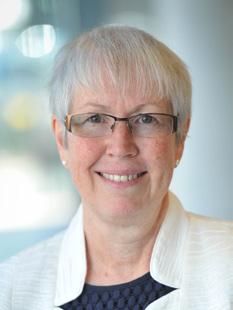
page 1
NEWS Issue 4 Summer 2018
UNIVERSITY OF SUFFOLK
A YEAR IN FOCUS
The 2017-18 academic year has been a momentous year in the young life of the University of Suffolk.
A year since its independence on 1 August 2016, we have seen significant developments in the University’s portfolio of courses, its research, its community engagement and impact, and in its constant drive to provide an excellent student experience.
Excellent Student Experience
As a community impact higher education institution and as a university proud of having the 3rd largest community of students from ‘Widening Participation’ (WP) backgrounds, we put our students at the heart of our planning and development. The National Students Survey (NSS), as one measure of how students view their University provided us with very encouraging feedback. The NSS 2017 was the first year that University of Suffolk entered in as an independent University. We were extremely pleased that 10 of our courses received 100% satisfaction. The courses receiving 100% were: BA (Hons) English, BA (Hons) History, BA (Hons) Graphic Design, BA (Hons) Photography, BSc (Hons) Psychology and Sociology, BSc (Hons) Psychology and Criminology, BSc (Hons) Radiotherapy and Oncology, BSc (Hons) Child Health Nursing, BSc (Hons) Mental Health Nursing (Work Based), and FdSc Network Engineering. We are looking forward to seeing the NSS 2018 results, published on 27 July 2018. We wrapped up the year with the University of Suffolk significantly improving its overall position as well as its subject rankings; these included our History programme being ranked 5th in the country, our Photography programme ranked 10 th, and a number of subject areas being ranked in the top 30 universities in the country.
With our new Vice-Chancellor, Professor Helen Langton, starting on 1 June, we have ended the 2017-18 academic year on a high and in short, this has been a year of significant development for our University, which has laid the foundation for our future successful development. History ranked 5th in the country, out of 96 institutions
Photography ranked 10th out of 67
Design ranked 26th out of 75
Hospitality and Tourism ranked 28th out of 28
Health Profession ranked 28th out of 72
English rising 43 places to 33rd out of 105
Criminology ranked 31st out of 64
Sport Sciences ranked 37th out of 76
Professor Mohammad Dastbaz Deputy Vice-Chancellor
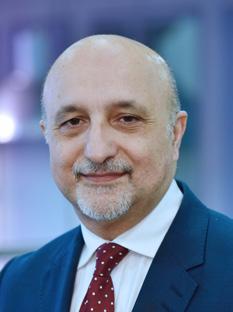
Our new portfolio
Becoming an independent university meant that we had the opportunity to look at our undergraduate and postgraduate portfolio of courses and embark on an ambitious programme of development responding to our regions need for economic growth and providing the highly skilled workforce required to implement the industrial strategy. Thus, a whole range of new programmes including Cyber Security, Architecture, Law, Economics, Project Management, and Marketing, to name a few, were developed and successfully validated. The new areas of development have been backed with significant investment by the University putting in place new resources and around 30 new high calibre academic staff joining our University.
As part of our new portfolio development, we also worked closely with our local business and community partners to put in place a range of degree apprenticeship programmes ready for delivery in the 201718 academic year. The University now has over 200 degree apprenticeship students going through programmes in Adult Nursing, Business Management Professional (Chartered Manager), Digital and Technology Solutions, Mental Health Nursing, and Healthcare Assistant Practitioner (Higher Apprenticeship). We have also put in place plans to start new degrees and postgraduate apprenticeships in areas such as Cyber Security Technical Professional, MBA (Senior Leader Masters Degree Apprenticeship), Social Work and Policing for delivery in 2018-19.
Issue 4 Summer 2018 page 2
A YEAR IN FOCUS
The first Suffolk Sustainability and Innovation Summit was held within the Ipswich Waterfront Innovation Centre (IWIC) at the University of Suffolk on 2 February 2018.
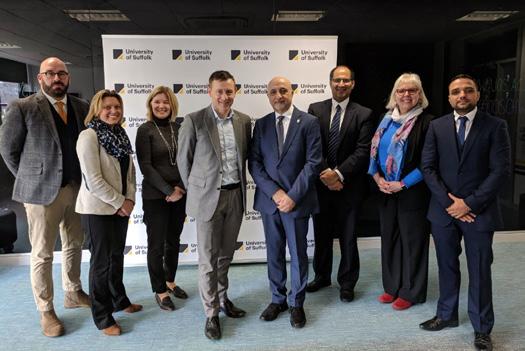
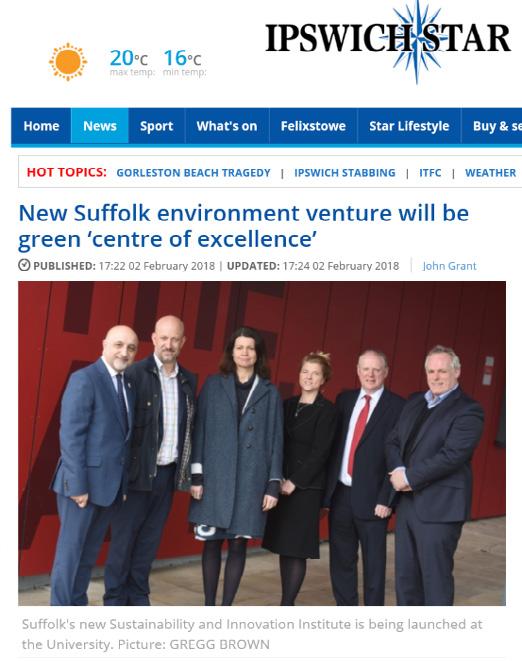
The event brought together Industry and Academic Leaders, businesses, students and key stakeholders to reflect on how innovation is unlocking the true value of incorporating sustainability into business strategy. The event also saw the launch of the Suffolk Sustainability Institute (SSI) in partnership with Suffolk County Council. This Institute will provide consultancy and research, support innovation, and enable knowledge transfer and skills development for business, community, policy and place makers, in Suffolk and through UK-wide established networks. The Institute will provide a regional centre of excellence for transforming and supporting a constant dynamic progression towards UN’s Sustainable Development Goals (SDGs). Cllr Matthew Hicks, from Suffolk County Council, delivered a keynote speech at the summit emphasising the importance of the new Institute and the collaboration between the University and Suffolk County Council.
Professor Mohammad Dastbaz Deputy Vice-Chancellor
On 9 January 2018, we held an important conference on ‘Emerging and Current Challenges in Cyber Crime’ jointly with the Centre of Excellence in Terrorism, Resilience, Intelligence and Crime at Sheffield Hallam University. Keynote speakers including Tim Passmore, Chief Crime Commissioner, and Chief Constable, Gareth Wilson, talked about the challenges of cyber crime and online security facing our communities. This event also saw the launch of the ‘Institute of Security’ led by Professor Nicholas Caldwell.
On 5 February, we launched a partnership with Leeds Beckett University running the ‘One Suffolk’ initiative for Suffolk County Council. The launch coincided with the establishment of a new Centre for Health and Wellbeing Research at the University of Suffolk. The Centre for Health and Wellbeing Research is led by Professor Jill Robinson and resides within our School of Health Sciences. The Centre brings together a growing body of research from across the institution and aims to develop its portfolio of funded research responding to key health and wellbeing challenges within the local population.
Developing our research
The 2017-18 academic year also saw significant developments in our research portfolio. A number of new research institutes and centres were established, and the University hosted a number of significant national conferences.
Issue 4 Summer 2018 page 3
Exploring neaco
The Network for East Anglian Collaborative Outreach (neaco) is a consortium of five universities and eight Further Education (FE) colleges across East Anglia, is working to increase progression to higher education and degree level apprenticeships.
neaco is one of 29 consortia across England which together form the National Collaborative Outreach Programme (NCOP).
The University of Suffolk is the operational lead for all neaco delivery in Suffolk and a team of 11 Higher Education Champions (HEC), who are based in target schools and colleges, deliver and facilitate a diverse programme of inspirational and aspirational activity.
The neaco programme aims to support the Government’s goals to:
double the proportion of young people from disadvantaged backgrounds in higher education (HE) by 2020
increase by 20% the number of students in HE from ethnic minority groups
address the under-representation of young men from disadvantaged backgrounds in HE
In Suffolk the HECs work with students from 25 target wards, through 35 schools and sixth form colleges and our three partner FE colleges. We have a target of working with 2,000 students in the first two years of the programme, to December 2018. So far they have engaged with over 1,200 (60% of target).
The Office for Students (OfS) has recently announced that NCOP funding will move to academic years and therefore have confirmed that funding is secure to the end of July 2019. The OfS will be conducting a review of their Widening Participation funding with the intention of deciding in December 2018 the future of NCOP and funding through to 2020/21.
HEC activities in schools and the community
The HECs deliver, organise and commission a very wide range of activities at schools but also organise educational trips and visits to universities and colleges across the region.
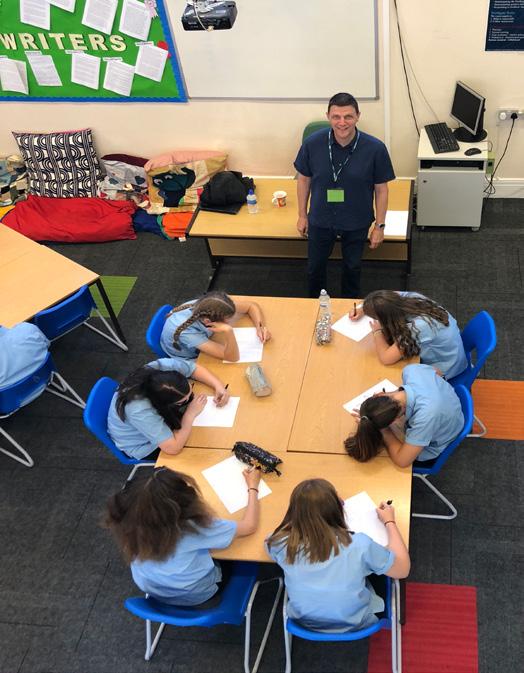
So far they have organised nearly 3,000 events with our target students. For example, Stoke High School have just finished their six week dance programme with ‘Just Jay’ dance and are linking to the University of Suffolk Dance degree and the ‘Take Your Place, Get Set, GO’ sports festival on 4 July for Year 9 students.
This year the University is running the first neaco residential for students from across Suffolk. The three day programme of activity will include academic tasters and project work. There will also be a residential between the University of Suffolk and Norwich University of Arts for those interested in Photography in July.
Guest speaker Dave Smith (pictured) talked to Year 9 students at Northgate High School in Ipswich about creative writing.
Issue 4 Summer 2018 page 4 IN FOCUS
Exploring neaco (continued)
Community Grants

This year neaco has been funding a range of community organisations to deliver innovative activity and programmes in the community with particular focus on engaging the parents/carers of our target students but also includes programmes for young people over the summer. In Suffolk, neaco has funded eight community organisations to work in Ipswich, Stowmarket, Haverhill and Sudbury.
School Grants
To support the aspiration and progression of target students into higher education, neaco has provided funding to schools and sixth form colleges for specific projects.
The following are some of the successful applications showing diverse and innovative approaches to supporting outreach activity.
Ormiston Denes Academy
A STEM focused summer school working with students with an interest in STEM subjects. Activities for the summer school include a visit to the University for a higher education taster day, visits to London to experience the museums, visits to post-16 providers and local STEM employers.
Chantry Academy
Around 30 student representatives to visit parliament to see how decisions are made nationally. The project will include meeting with MPs to discuss the merits of being active participators in their community. School students will also have the opportunity to meet with politics graduates in London and academics from the Politics degree programme at the University of Suffolk to discuss university pathways.
A group of students to travel to the National Museum of Computing at Bletchley Park to introduce concepts of computing beyond the classroom and introduce the history of computing. Students can also explore the areas of Cryptography and Computer Programming.
End of Year Show
June saw the very successful Art, Design and Humanities degree show.
Work from English, Fine Art, Interior Architecture and Design to Digital Film Production and Graphic Design was on display.
Dr Lisa Wade, Dean of the School of Art, Design and Humanities, said, “At the culmination of our academic year, we celebrated the achievements of students across all creative areas with our End of Year Show. The Show provided students with an opportunity to present their collected works in a formal setting and to demonstrate the broader working and academic contexts that inform their practice.”
Photography students exhibited their work earlier in the month as part of the PhotoEast Festival. It is the second time the University has hosted the festival which runs along the Ipswich Waterfront and this year followed the theme of Belonging.
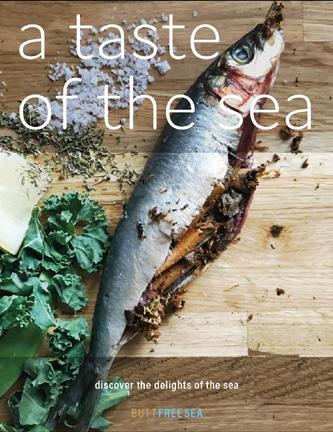
Issue 4 Summer 2018 page 5
IN FOCUS
Scarlett Painter
Louise Flores
Dr Paul Andell
Following the recent incidents of violent crime in Ipswich, Dr Paul Andell has provided insight and commentary to the media on the issues of gang culture and the rise in these types of crimes:
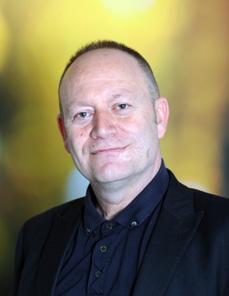
I have been a practitioner and have researched knife crime, gangs and drug markets, for about 20 years.
Firstly it is fair to say that it is clear from national statistics that knife crime is on the increase in England and Wales. There were 37,443 offences in the 12 months ending in September 2017, a 21% increase on the previous year and the highest number since 2011, the earliest point for which comparable data is available (Home Office).
It should also be noted that the majority of knife offenders are adults. Last year, 19,243 people were cautioned, reprimanded or convicted for carrying a knife in England and Wales, most of whom were adults. But one in five, 4,148, was under the age of 18, the highest number for seven years (Ministry for Justice).
Our recent research in Ipswich (Andell and Pitts 2017 ) explains violence and exploitation as being precipitated by the drugs business and gang culture. Metropolitan gangs have been expanding their drug businesses into smaller towns and cities through what is known as county lines for at least the last 5 years. It is said by the National Crime Agency (NCA) that county lines affect about 90% of the country. County lines operate by drug users contacting a dealer in a larger city via a known mobile phone number. The dealer then uses a different line to contact a local delivery agent or “shotter” to deliver.
In summary what the report explains is that some drug markets are changing. The lower end retail markets in crack and heroin are becoming more dangerous due to the involvement of gangs. Local drug businesses have been taken over or co-opted into larger drug network franchises.
Dangers exist for young people exploited into working in county lines. Sometimes young people from Suffolk and larger cities go missing because they are coerced into transporting drugs on the public transport system, sometimes in their body cavities. A practice known as “plugging”. Or they disappear for days to work in flats
that have been occupied for drug sales from vulnerable substance misusers known as “cuckooing”. Some as young as 10 deliver drugs when they receive calls from gang elders on their phones. Young women may also be sexually exploited and trafficked by gang members.
People generally ask why here, why now? Shifts in the labour market, public services and popular culture has resulted in some young people seeking rewards and respect through the alternative market of drugs and the perceived protection of gangs. The street drugs business is often accessed through belonging to a gang, often known as “fam” or family. Services to support young people to make the right choices have reduced significantly recently with 90% of local authorities said to have made cuts to youth services since 2010 (Unison 2017).
The University of Suffolk has been assisting local partners to devise a strategy to reduce harms from county lines. This strategy broadly consists of targeted enforcement, gang exit work, prevention and education and community development work. While there has been some development of practical application of this strategy there is still some way to go to develop the dynamic involvement of stakeholders in neighbourhoods our report envisaged. However, it is fair to say it is early days for the recommended multi-modal strategy to be enacted and as a good community partner, the University are always here to assist future phases of this work if needed.
Issue 4 Summer 2018 page 6 IN FOCUS
Award successes
Fine Art Graduate wins a BP Portrait Award
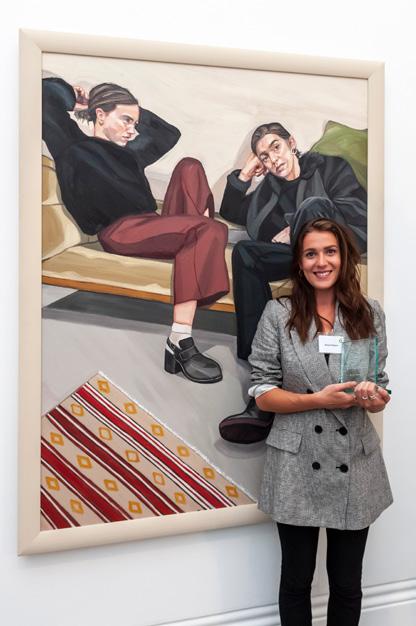
A graduate of the University of Suffolk’s Fine Art degree has been awarded the Young Artist Award in the BP Portrait Awards.
Ania Hobson’s A Portrait of Two Female Painters depicts the artist with her sister-in-law Stevie Dix and explores the relationship between the two of them as painters working in the studio together.
Ania was one of only four artists to have been shortlisted for the Awards at the National Portrait Gallery in London. It is one of the largest art competitions for portrait painters in the world. The artworks were selected from 2,667 entries from 88 countries, submitted for judging anonymously by a panel which included journalist and broadcaster Rosie Millard and artist Glenn Brown. Last year Ania was selected to exhibit, this is the first time her work has been considered for the Awards.
The BP Portrait Award 2018 exhibition will run until Sunday 23 September 2018.
For information about the prize winners visit National Portrait Gallery Prize Winners
For more about Ania’s work visit www.aniahobson.com
Student receives top award from the Royal Society of Biology
Explorative research on apparently simple questions can sometimes reveal itself as having a huge, readily applicable impact. This was the case for the research work initiated as an undergraduate student project, on a model of muscle cells grown in vitro. The project, undertaken by student Jordan Schofield, has been recognised by the Royal Society of Biology as the ‘Student Top Accreditation Award’. The award seeks to acknowledge outstanding research work of undergraduate biologists by publicly recognising their skills and abilities and inspire them into pursuing a career in science.
Jordan’s work was developed into a research project led by Dr Masieri in collaboration with an Italian company leader in the field of medical biophysics and with input from colleagues working at King’s College London. The project was supported in part by the University of Suffolk’s Foundation Board. The results were presented at the OARSI (Osteoarthritis Research Society International World) Congress, held in Liverpool and published as a supplement in the prominent medical journal Osteoarthritis and Cartilage.
Dr Masieri said, “It is fantastic to see that our work has been recognised in such an eminent convention: it is proof that our University of Suffolk Science students are exposed to forefront research. The results of this study may open up new avenues of helping muscle repair and we are very excited to take it forward with our students and collaborators.”
In September Jordan Schofield and fellow MSc Regenerative Medicine student, Jamie Ballisat, will present their work at the prestigious European Orthopaedic Research Society Conference in Ireland.
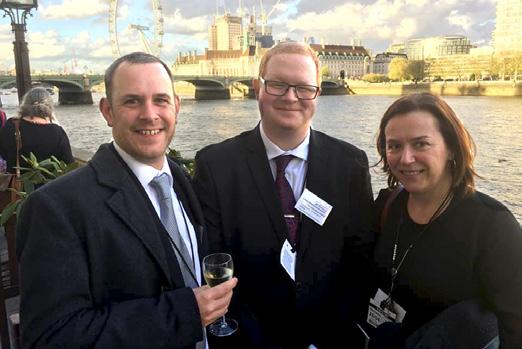
Issue 4 Summer 2018 page 7 NEWS AND UPDATES
Photo: Jorge Herrera
Award successes (continued)
Student and employee wins national Festival of Learning award
A student and member of staff at the University of Suffolk has been announced as the winner of the Festival of Learning Patron’s Award for her exceptional achievement in adult learning.
Terrie Cornwell-Dunnett, was selected as the recipient of the special award by the Learning and Work Institute’s Patron, HRH The Princess Royal. The award recognises individuals who, through learning, have transformed their own lives and the lives of their families, friends, their communities, and the places they work.
As a young child, Terrie was told she would never amount to much. Fortunately, her foster father disagreed, and with his support and guidance, Terrie slowly began to believe in herself again. Terrie went on to secure a place at college to study for a BTEC Diploma in Social Care, where her passion for social equality was ignited.
Living with a disability herself, Terrie, age 42, has always been motivated to learn and understand more about disabilities and she has gone on to support children who are hearing-impaired for many years.
When Terrie saw the University of Suffolk promoting a degree in Special Educational Needs and Disability Studies, Terrie knew that this was her chance to pursue something she felt passionately about. Aware that studying for a Degree as a mature student while also working at the University in the Operations Team and raising a child would be difficult, Terrie was determined to progress her career and needed formal qualifications to do this.
Terrie commented on her learning journey: “I hope to achieve this degree and make valuable changes to other people’s lives. My foster dad has always believed in me and it’s this belief that motivates me to go on.”
Terrie’s nominator, her Personal Tutor and Course Leader, Dr Allison Boggis from the University of Suffolk said, “She is a remarkable woman who inspires others to achieve and reach their potential.”
Stephen Evans, Chief Executive at Learning and Work Institute, added, “Terrie’s dream to help others like herself has been made possible by her dedication to her learning. She has overcome challenges of her own disability, low confidence and raising a family to now being a university student. We are delighted to be awarding Terrie this special accolade chosen by our Patron, HRH the Princess Royal.”
“Festival of Learning is all about inspirational stories of people like Terrie that show that anyone can benefit from learning. Lifelong learning is vital for all of us as jobs and society change around us. We encourage everyone to give learning a try, particularly in June when hundreds of free activities can be found on our Have a Go Month calendar. Further information on learning opportunities and support with the costs of courses is available through the National Careers Service, colleges and community learning providers.”
Award success for Nursing Lecturer
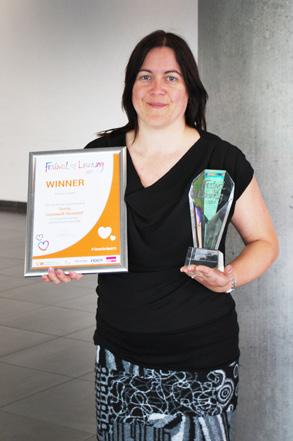
An Adult Nursing Lecturer at the University and practicing nurse has become one of the first winners of a Cavell Star Award.
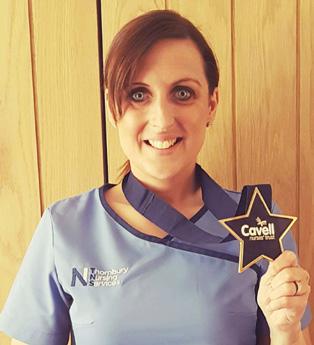
Pippa Sharp, a Staff Nurse with Thornbury Nursing Services in Bury St Edmunds, was nominated by a colleague for going above and beyond for her colleagues.
Cavell Nurses’ Trust is the charity that supports UK nurses, midwives and HCAs, both working and retired, when they’re suffering personal or financial hardship often due to illness, disability, older age and domestic abuse. In 2017, the charity received more than 2,200 calls for help.
Issue 4 Summer 2018 page 8 NEWS AND
UPDATES
International visitor to the SENDS programme
The BA (Hons) Special Educational Needs and Disability Studies (SENDS) students have benefitted from a visit by Assistant Professor, Dr Maureen Johnson (pictured) from the Department of Health Sciences (Public Health) at Indiana State University.
Dr Johnson attended a lecture by Dr Cristian Dogaru and it is her third visit to the University following the Children and Childhoods conferences in 2015 and 2017.
Dr Johnson has a personal and professional interest in autism and believes that there are many misconceptions concerning autism. As someone with first-hand experience, her passion is to raise awareness and inspire children and adults with autism.
Working closely with Dr Allison Boggis, Dr Johnson is researching ways that undergraduate students from Indiana and Suffolk can work collaboratively on projects involving young disabled people. The Level 5 BA SENDS students will be sharing their experiences of working with disabled children and young people via a Skype link between the universities later this semester and are hoping to start some virtual conversations in the near future.
Dr Boggis and Dr Johnson presented topics relating to SENDS at the International Festival of Learning at the West Suffolk College recently, which was attended by over 1,000 delegates from across the region.
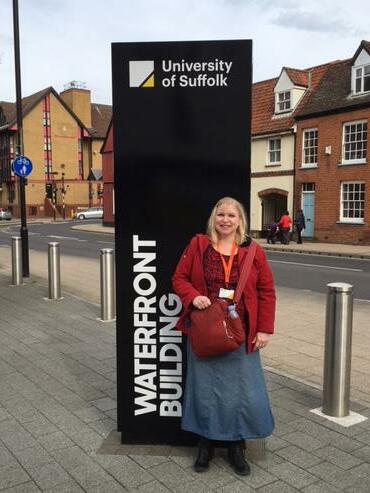
Virtual Violence: Technology-facilitated Domestic Abuse and Control
The University hosted a conference addressing ‘Virtual Violence’ which looked at technology facilitated domestic abuse and control.
The aim of the conference was to bring together multiagency practitioners, academics and students in order to raise awareness of technology-facilitated abuse, advance understanding around the digitalisation of abusive relationships and to discuss approaches moving forward.
Laura Higgins from the Revenge Porn Helpline gave the keynote speech. The organisation has reported a 110% rise in cases over the last two years with a quarter of cases involving ‘threats to share’.
Laura said, “I was delighted to support the University of Suffolk in their efforts to bring together a diverse range of professionals and organisations to share best practice around safeguarding victims of Virtual Violence. The event was a great success and I hope the learning from it is shared across the region. The impact of these offences are catastrophic and it is essential that there are effective services to help victims to recover and rebuild their lives.”
The event was held thanks to the funding awarded to the University of Suffolk by the HEFCE (Higher Education Funding Council for England) catalyst fund.
The funding was awarded to universities to tackle online harassment and hate crime. The University of Suffolk is taking a whole university community approach with an aim to increase digital civility and online safety amongst our students by raising awareness via workshops, seminars and conferences as well as the Digital Civility survey and speaking to students directly. The University hopes to increase staff confidence in responding to disclosures with a digital element.
The conference should aid in increasing awareness of phenomena such as revenge pornography and the use of technology in coercive and controlling relationships, something which is becoming increasingly prevalent across young people.
Issue 4 Summer 2018 page 9
NEWS AND UPDATES
Social Media and Social Work
The sixth annual Practice Educator Conference for social workers across the region was held.
Historically the conference has been a partnership between University of Suffolk, Essex County Council and Suffolk County Council. This year, as part of the new Teaching Partnership, Norfolk County Council and the University of East Anglia were also involved.
The Conference, entitled ‘Social Media in Social Work’, discussed emerging practice issues that are pertinent within social work education and is one of only a few held nationally that provides a forum for practice educators to share their experiences and further their knowledge and skills.
Amanda Taylor from the University of Central Lancashire provided the keynote address. Amanda is a technologyengaged social work academic with a keen interest in embedding new technologies into teaching and learning practices with the aim of influencing the development and use of technologies in the social work practice space. She was voted one of the Top 50 in 2016 by the higher education community in recognition of her innovative approach to teaching and learning.
Amanda has been commissioned to deliver digital literacy training to many local authorities to assist them to map their digital journey for practice effectiveness in line with the digital shift. She is currently advising Social Work England, the new regulator for social work in England, regarding building a digitally ready workforce based on her research which examines the contribution of social work education to the digital development of students in relation to preparing them to be ready for social work practice.
Amanda said of the conference, “I was delighted to be invited, particularly given the subject matter ‘Social Work and Social Media’. I began by sharing my contributions through the development of an online discussion space, made available to all delegates. I made a number of connections with Practice Educator and Academic colleagues well in advance of the actual event. There was certainly a warm, welcoming atmosphere and an openness to learn together. There was a real thirst for information throughout the day, a reflection of the progressive thinkers in the room.”
“The comments, questions and connections continued via Twitter and the conference hashtag #uospeconf18 after the event had finished. This, for me, yet again evidenced how new social technologies and spaces can support ‘communities of learning, for practice’.”
Lecturer in Social Work at the University of Suffolk, Heidi Dix, said, “We are grateful to Amanda Taylor for her innovative sessions and to other contributors this year for their informative and engaging workshops such as Suffolk Constabulary, The Potato group and the Health and Care Professions Council.”
Proud to sponsor Elmer’s Big Parade Suffolk
The University has been named as the 40 th sponsor of Elmer’s Big Parade Suffolk for St Elizabeth Hospice.
Following ‘Pigs Gone Wild’ in 2016, Elmer’s Big Parade Suffolk comes to Ipswich from June to September 2019, bringing 50 large and 100 young Elmer elephant sculptures to discover around the town.
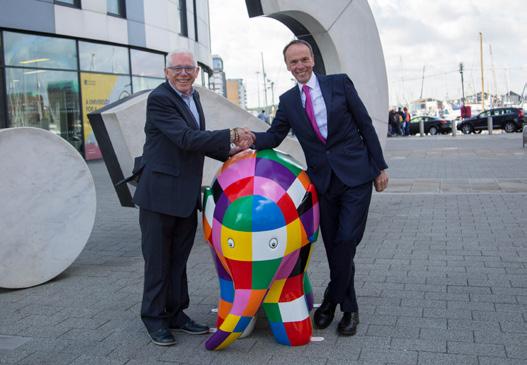
Elmer the colourful patchwork elephant has been a nursery favourite since the first book was published by Andersen Press. A modern classic, this picture book is known to millions, and the entire Elmer series has sold over 8 million copies around the world. The subtle inclusive message is that it is ‘OK to be different’.
The parade will once again be run in conjunction with public art event specialists, Wild in Art, as well as children’s publisher Andersen Press, publisher of Elmer since 1989.
Issue 4 Summer 2018 page 10
NEWS AND UPDATES
The Centre for Integrated Research across Educational Spaces
The University is continuing to expand its research offering with the introduction of the Centre for Integrated Research across Educational Spaces (CIRES).
The new Centre follows the creation of several others at the University, bringing expertise from across the University into one place.
CIRES will offer holistic approaches to research into educational access and progression, extending across subject areas, educational sectors and formal and informal learning environments.
Dr Clare Gartland said, “The learning journey through different institutions and into the workplace represents challenges for people of all ages and backgrounds, particularly for those who have been traditionally excluded from certain routes. The ambition of the Centre is to identify and inform best practice in supporting equality in access and progression across all stages of education.”
CIRES will:
Conduct high quality local, national and international research
Build on and develop expertise in research and practice that supports access and progression across educational contexts
Create an active physical as well as a virtual centre where relevant knowledge is regularly shared and critiqued
Foster a vibrant hub for early career researchers, PhD students and their supervisors
Support members in disseminating and promoting research outputs
Develop a forum in which cross-disciplinary research and/or projects are fostered
It will provide and support opportunities for cross-sector and cross-disciplinary research collaborations, promoting innovative partnerships and networking opportunities.
Dr Gartland added, “This is an exciting new venture. As well as bringing expertise together within the University, we are really pleased to be working with leading experts such as Professor Miriam David from the Institute of Education, London and Professor Penny Jane Burke from the University of Newcastle, Australia.”
The Centre was launched during the British Educational Research Association (BERA) conference entitled ‘Research and Pedagogy in the Classroom’. Professor Miriam David, Professor John Pitts and Jonathan LeighSmith from BT provided introductions.
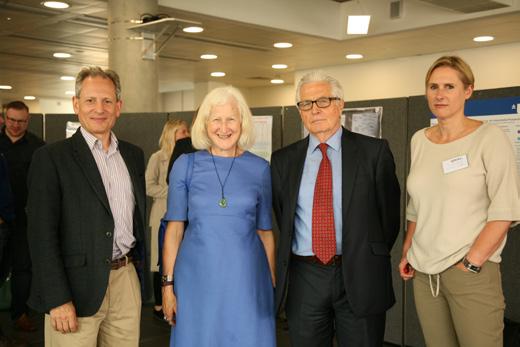
The conference brought together teachers and researchers to present, discuss and engage in collaborative reflection on the role of research in the classroom. Professor Chris Brown from the School of Education and Childhood Studies, University of Portsmouth, gave the keynote address.
Working with the Royal Academy
Dr Liana Psarologaki, Course Leader for Architecture, Fine Art and Interior Architecture and Design, was one of the eight selected presenters at the Royal Academy (RA) Experiencing Architecture: Inviting Dialogue.
The two-part event explored the dynamic and reciprocal nature of architectural experience and was organised by Kate Goodwin, Head of Architecture at the RA.
Dr Psarologaki has recently spoken about her work at a conference in Istanbul and will be speaking at the Spatiality and Temporality Conference at Birkbeck, University of London, in July.
Issue 4 Summer 2018 page 11
NEWS AND UPDATES
Our pledge to become dementia-friendly
The University is set to become a ‘dementia-friendly organisation’ as recognised by the Alzheimer’s Society.
Dementia refers to an incurable, degenerative group of brain disorders, and the number of people affected by dementia is growing. In the UK alone, dementia will affect one million people by 2025.
Paul Driscoll-Evans, Dean of Health Sciences said, “Health and social care services are struggling to meet the challenge of unprecedented numbers of older people living with memory loss. In recognition of the impact dementia is having on communities across the East of England, the University of Suffolk aims to be a role-model organisation, actively playing a role in ensuring those living with the condition feel understood and valued.”
The University’s pledge will involve an institutional commitment to developing a Dementia Action Plan and becoming a member of the Dementia Action Alliance. The University will focus on several key areas that seek to raise awareness, support staff and students and promote excellence in teaching and research. These include:
Working in partnership with charitable organisations, the NHS and local businesses to raise awareness of dementia across Suffolk
To build on the University’s capacity to undertake research into dementia and encourage the involvement of people with dementia and their carers in research
MBA leading to success
The manager of an Ipswich home care company credits the MBA she is undertaking at the University with her meteoric rise to success.
Joanna McCall started work as care co-ordinator at Home Instead Senior Care in November 2012. Less than six months later she was promoted to deputy manager, and in November 2017 she took on the role of general manager, overseeing a large team of office staff and caregivers.
The 47 year old mum of three started her MBA in 2016, and says it has greatly contributed to her success. She said: “I think the Masters degree has definitely played a big part in my progression from care manager to general manager, as
activities through the University’s Centre for Health and Wellbeing Research.
To provide training for the University’s customer-facing staff and students to enable them to offer effective support and communication to people who live with dementia.
A launch event was held coinciding with Dementia Action Week (21–27 May), which is aimed at calling on everyone to take action to improve the everyday lives of people affected by dementia.
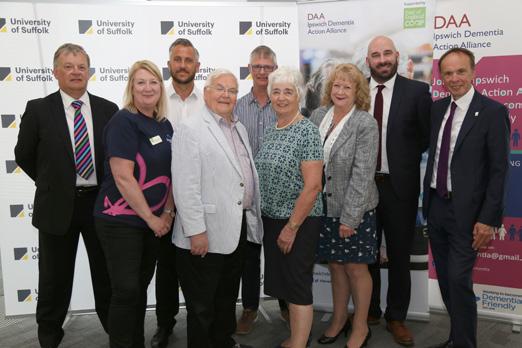
For anyone interested in finding out how to support someone living with dementia or for information on volunteering and fundraising please visit the Dementia Action Alliance website www.dementiaaction.org.uk
it has taught me all the ins and outs of running a business. Home Instead has given me the time to go to university on a Wednesday afternoon, which has been a big help, and I also do a lot of it in my spare time.”
Just a few weeks after Joanna took over as general manager, Home Instead Ipswich was inspected by the Care Quality Commission (CQC), and in January this year received the top rating of outstanding. The CQC report praised the ‘dynamic leadership demonstrated at all levels’ and said the manager ‘promoted the highest standards of care and support, delivered by an extremely passionate and highly motivated workforce’.
Issue 4 Summer 2018 page 12
NEWS AND UPDATES
To mark International Day of the Midwife in May students held an event at the University with a stand in the Waterfront Building foyer. The theme this year was ‘Midwives leading the way with quality care’ and first and third year students shared their journey to becoming midwives.
First year student, Melissa Ayriss, created a poster consisting of pictures of things her peer group have done so far during the course with reflective quotes from students. Additionally there were student’s academic assessed posters on display, as well as the students bringing their own learning materials. A cake sale was held alongside some Midwifery related games, such as: guess the weight of the baby, guess how many jelly babies were in a jar and pin the cord on the placenta.
International collaborations
Working with research colleagues in Portugal
Lecturers Vanessa Rawlings and Kelly-Marie Taylor from the School of Psychology and Education and Katie Tyrell, Research Assistant in the Suffolk Institute for Social and Economic Research are working in collaboration with Portuguese research colleagues from the Univerisdade Nova de Lisboa. The University are carrying out longitudinal research on children’s digital technology use as part of the international EU Kids Online project. Recently an invitation was extended to visit Portugal to engage in a research exchange workshop. The team from the University of Suffolk also presented various funded and PhD research on UK children’s experiences and use of digital technologies to an invited audience of postgraduate students studying in the School of Communication Sciences, and academics from the Faculty of Social Sciences and Humanities. The team also met with Carla Maria Bapista, Sara Salvaterra Martins and Subdirector of International Relations and Erasmus, Luís Oliveira Martins to discuss future collaborations within the Faculty, which is celebrating its 40th anniversary this year.
The School of Psychology and Education is this year hosting post-doctoral researcher, Dr Teresa Sofia Castro, from the Univerisdade Nova de Lisboa during her research on digital technology with Portuguese families living in Ipswich.
The team’s efforts were recongised by being named the ‘Best Dressed Event for the East of England region’ in the Royal College of Midwives International Day of the Midwife competition.
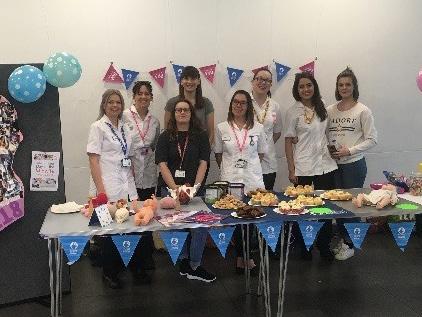
MBA students visit Indonesia
A group of MBA students have recently spent a week in Indonesia as part of their Consultancy Management and International Business module. The students went to Binus Business School in south Jakarta for two sessions: the first, an overview of ASEAN trade; the second, basic Bahasa Indonesia language skills.
The trip included a visit to Pernakpernikku Ceramics, a relatively young Indonesian company employing thirty craftsmen. The group met with the CEO and discussed the company’s aspirations and practical requirements in more detail. Although Pernakpernikku has already taken the first tentative steps into international markets, it sought the students’ assistance to develop an appropriate international expansion strategy, with a focus on European markets.
The group visited the Jarkata British Embassy, meeting with the Trade and Investment Director and Deputy Director and Operations Manager, and following this developed a detailed international expansion strategy for Pernakpernikku Ceramics. They presented their strategy and associated recommendations in front of Pernakpernikku’s CEO, Binus University Faculty, a film crew and Dr Tom Vine, Executive MBA Programme Leader.
Dr Vine said, “The students performed admirably and were awarded a distinction for their efforts.”
Issue 4 Summer 2018 page 13
NEWS AND UPDATES
International Day of the Midwife—University stand wins ‘best dressed event’
Portuguese interns collaborate at the University of Suffolk
The University of Suffolk has welcomed four interns from Portugal thanks to a collaboration with the Portuguese Government. The interns, who are supporting the University in several areas, will be in Suffolk for a six month period.
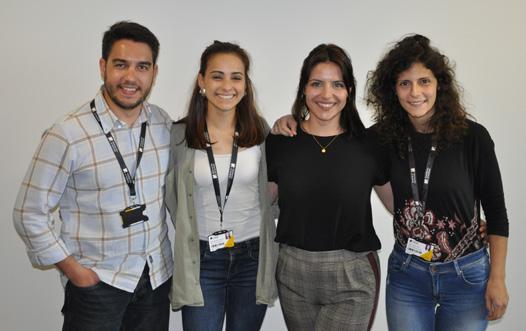
Professor Mohamed Abdel-Maguid, Dean of the School of Science, Technology and Engineering, said, “I am delighted that Anita, Cátia, Francisca and Ricardo chose to join the University of Suffolk for their internship. They have fitted in from the first day and started working with the School team on a wide range of projects. I am personally impressed with their calibre and commitment and I hope and trust their time with us will help them progress their career further. We welcome future collaborations with such talented graduates.”
Knowledge exchange opportunities
The University is helping local businesses to launch new products and services by connecting business to academic expertise and graduate talent.
The Ipswich Waterfront Innovation Centre (IWIC) are holding “Spring into Innovation” events across Suffolk this summer where businesses can drop in to find out about funding available in East Anglia. For more details contact IWIC@uos.ac.uk
World Association for Sustainable Development Conference
Dr Daba Chowdhury (pictured), Associate Professor and MBM Programme Leader, recently presented at a conference held at the United Nations.
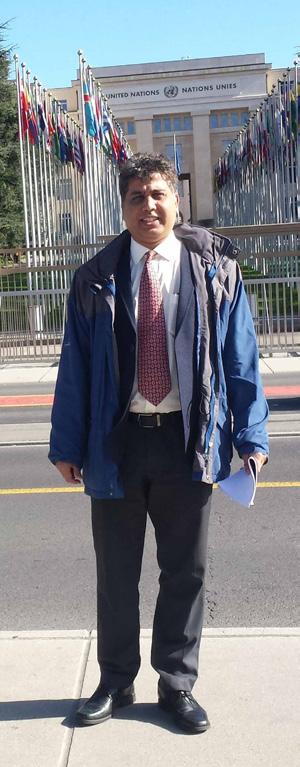
The annual conference of the World Association for Sustainable Development (WASD) was jointly organised and hosted by a UN body, namely the Joint Inspection Unit of the United Nations system (JIU). Both JIU and WASD are inspired by the conviction that the 2030 Agenda and its 17 goals provides momentum for a renewed UN engagement with the private sector.
The conference aimed to provide practical recommendations and actions to help transform the way the UN conducts and uses research to achieve the Sustainable Development Goals, and the way research institutes access and benefit from UN data.
Dr Chowdhury’s talk was entitled ‘Development and integration between public and private entrepreneurship and globalisation’.
He said, “I was happy to be there and proud to be presenting the University of Suffolk to the UN and WASD.”
Issue 4 Summer 2018 page 14
NEWS AND UPDATES
Academic presented with prestigious Churchill Medallion
Dr Clare Gartland, Association Professor of Education, has been presented with a Churchill Medallion. The medallion was awarded to Dr Gartland to mark the successful completion of her overseas research as a Churchill Fellow.
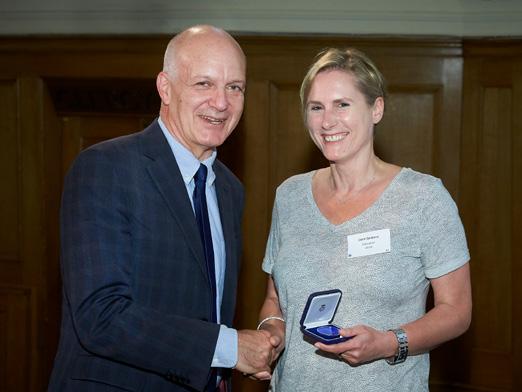
For her Fellowship, Dr Gartland travelled to America to research STEM (Science Technology, Engineering and Mathematics) outreach activity and focused on the contribution of student ambassadors and other ‘role models’ to outreach work.
Speaking about her Fellowship, Dr Gartland said, “The fellowship provided me with a fantastic opportunity to travel to the USA to find out about university outreach work with school students. I was particularly focused on outreach activity in STEM subjects and how university students working with schools can help to encourage them in these subject areas. Since returning from the USA, I have been using the knowledge gained during the Fellowship in my work with a wide range of organisations including the University of Suffolk, the Royal Academy of Engineering, EngineeringUK and Suffolk County Council.”
The Fellowships were set up in memory of Sir Winston Churchill on his death in 1965, and over 5,400 Fellowships have been awarded since then.
PUBLICATIONS
Law Gazette
Law lecturer, Dr Dimitris Xenos, has recently been interviewed by the Law Society’s Gazette regarding the government’s decision to join the new international judicial institution, the European Unified Patent Court. Dimitris’ opinion places this new issue of loss of national sovereignty in the post-Brexit referendum context.
Read the piece here
Dr Xenos submitted his position paper to the European Commission, as part of their public consultation on the revision of the EU’s SME definition. As the definition of a small and medium-sized enterprise (SME) is a key policy tool, its revision will affect the value and relevance of all previous studies and data that are connected to SMEs, as well as the policy framework in economic development matters.
This year’s Churchill Medallions were presented by distinguished photojournalist Nick Danziger, whose career began with a Churchill Fellowship that took him across Central Asia in 1982. This year Danziger presented medallions to 130 Churchill Fellows at the biennial Churchill Fellows Award Ceremony. It was held at Church House, Westminster, which was Winston Churchill’s temporary office during World War Two.
Nic Bury
Dr Nic Bury, Senior Lecturer in Life Science, has recently had his work on pharmaceuticals in aquatic fish and invertebrates published in the Environmental Pollution journal: Miller TH, Bury NR, Owen SF, MacRae JI, Barron LP. 2018. A review of the pharmaceutical exposome in aquatic fauna. Environmental Pollution 238, 129-146.
More information
Issue 4 Summer 2018 page 15
NEWS AND UPDATES
PUBLICATIONS
Le Monde
Dr Damien Cassan, Senior Lecturer in Police Studies, has been referenced in the French daily newspaper Le Monde.
Dr Cassan said, “The article in Le Monde is about the challenges of police recruitment and police training in France: recruiting more and in line with the new reform of ‘Police de la sécurité du quotidien’ (supposedly to improve police/population relationships) in the context of an increasing security threat.”

“I am cited for my ethnographic research on police socialisation in France and in England, and more specifically about on the job training of French police trainees.”
“My take on this is that French police recruits are undervalued and they are not properly tutored or supervised. With French policing, lack of police experience is synonymous of an absence of any useful knowledge, skills and worthiness.”
“As far as improving police-citizens relationships, I argue French police culture emphasizes public order policing and the crime fighting dogma much more than community policing. Thus, significant changes and sustained efforts are needed in terms of police recruitment and training.”
Dr Cassan has also published the following:
Cassan, D. “La relation police/population à la lumière de la socialisation du policier anglais” (police/Population relationship through the police constable socialisation process), Les Cahiers de la Sécurité et de la Justice (CSJ40), Paris, 2017, pp. 63-71.
Cassan, D. “Does the police work in the public interest? An international comparison between France and England”, in Pavlovic Zoran, Freedom, Security: The right to privacy, Novi Sad, Serbia, 2017, pp.535-546.
EVENTS
The Waterfront Gallery will host Mark Ward’s ‘Birds, Beasts and Bendy Stuff’ until 3 August PeliCantata #2 acrylic on canvas 40cmx40cm

The second Focus on Survivors conference will be held on 24 July The conference will provide an opportunity to launch the follow up research entitled “I’ll be a Survivor for the rest of my life”— Understanding Adult Survivors of Childhood Sexual Abuses’ Experiences of Support Services
For more information about our events programme please visit www.uos.ac.uk/events
IN THE NEXT ISSUE
The next issue, due out at the start of the next academic year, will include features on The Hold and the Ipswich Vision.
OVER TO YOU
We want this newsletter to be a reflection of all of the excellent projects, research and work being undertaken by our staff. If you have any feedback and suggestions for content please get in touch by emailing Atlanta Blair at atlanta.blair@uos.ac.uk Thank you.
Issue 4 Summer 2018 page 16






















